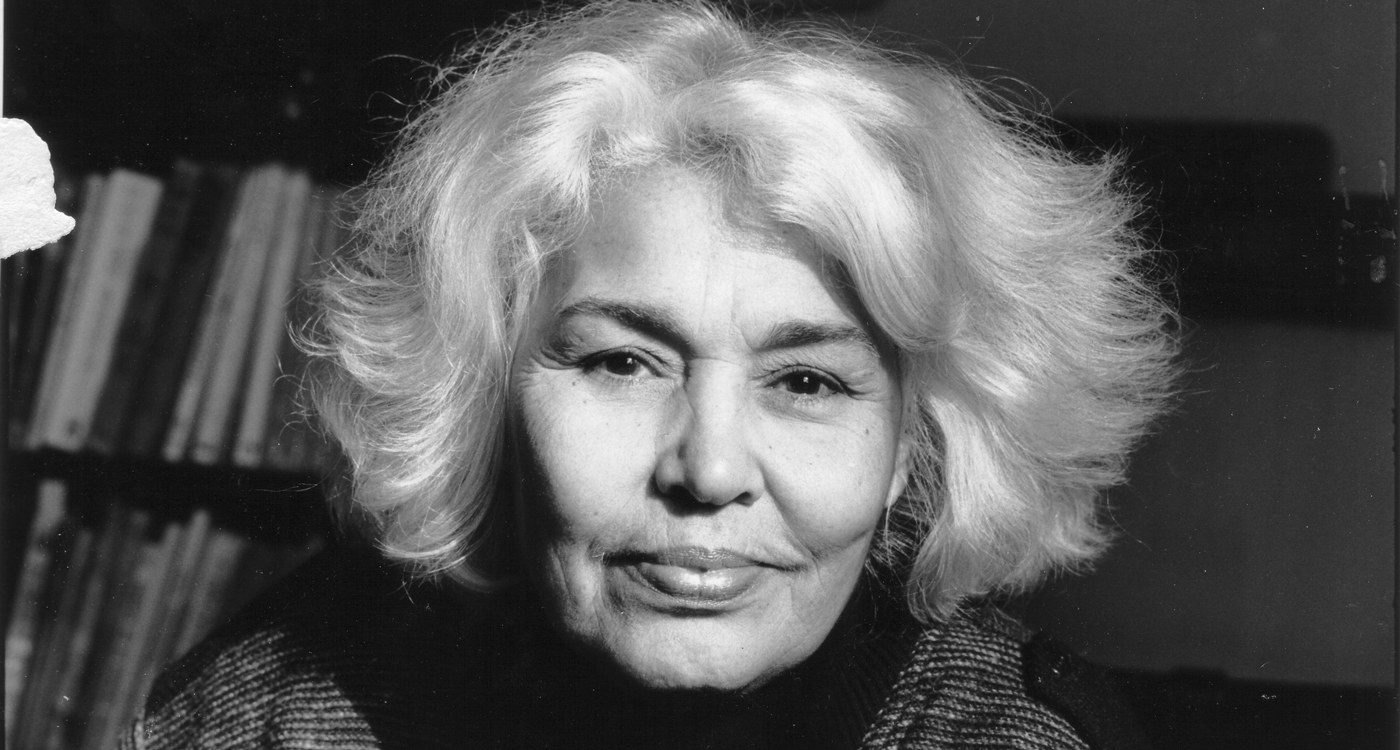No products in the basket.
Interviews
Interview with Nawal Al Sadawi
by Karine Ancellin Saleck
– Belgium –
“We must celebrate our similarities rather than our differences” — Nawal Al Sadawi
Nawal Al Sadawi was in Belgium invited by AWSA (Arab Women Solidarity Association) to reflect on Arab women in Europe. Because of her literary fame, Mrs Al Sadawi has had to face numerous difficulties and even dangers in her life. In 1972 she lost her job in the Egyptian government. The magazine, Health, which she had founded and edited for more than three years, was closed down. In 1981, President Sadat put her in prison. She was released one month after his assassination. From 1988 to 1993, her name figured on death lists issued by some fanatical terrorist organizations. She lived in exile for five years. In 2001, she won her case in Cairo court against forceful divorce from her husband (according to Hisba law). In 2004, Al Azhar in Cairo banned her novels, The Fall of the Imam and Al Riwaya. On 15 June 1991, the government issued a decree that closed down the Arab Women’s Solidarity Association, over which she presides, and handed over its funds to the association called Women in Islam.
Six months before this decree, the government closed down the magazine, Noon, published by the Arab Women’s Solidarity Association. She was editor-in-chief of this magazine. Nawal El Saadawi has been awarded several national and international literary prizes, and has lectured in many universities and organized and participated in many international and national conferences. Her works have been translated into many languages, and some of them are taught in a number of universities and colleges in different countries. On 8 December 2004, she presented herself as a candidate for the presidential elections in Egypt. Having done extensive research on Muslim feminism, I put to her the questions that lingered after my journalistic research.
Karine Ancellin Saleck: Mrs Al Sadawi, where do you draw the line between a Muslim feminist fighting for her rights and a Muslim activist?
Nawad Al Sadawi: Like for Christian feminist and a Christian activist. The idea that you can have feminism within a religion is incoherent, should it be Christianity, Judaism or Islam. In the States and in Europe, many Christian women tried to be feminist within Christianity and reinterpret the bible. They said that Christ was a black woman. So as such some Islamic women are reinterpreting the Koran and they can say Mohamed was a black woman or whatever they want. To reinterpret religion is a good; it’s positive and in the favour of women, because all the books, the Old Testament, the Bible and the Koran are biased in that they portray women as inferior to men. With the Liberation movement theology, there are Jewish women activists and feminists working to interpret the Old Testament to give men and women equality within Judaism, so the same happened with Christianity and the same is happening now with Islam. The Muslim activist should be defined by its activities, by the program they are implementing.
KAS: How do you know when the woman is willing to become a martyr, where is the crossing line between advocating for her rights within her faith, to acting for an extremist group?
NAS: Millions of Muslim women are active and they don’t kill themselves. Only very few take that step and they are working within a party, as a member, and this party brainwashes them and orders them to go and get killed. It has nothing to do with feminism or activism. It is political activism within a group of political parties. If we speak of activism, so many women are active socially, politically and intellectually. In literature, for example, I cannot begin to count them. They are not just housewives staying at home. These women killing themselves is not a phenomenon. There is an exaggeration of the one or two that actually take place at the time when George Bush is killing thousands of Iraqi and Palestinian women and children everyday and the media is silent about that, but if it’s a woman suicide bomber she will make headlines. I am a very free thinker, critical of all without restraint. I am not pro-Christianity or pro-Islam or such, but I am fair enough to say there is a very bad feeling about Islam and Muslims in the West. Islam is like Communism once was: the enemy. So I want to clarify that because of what the Pope said, that Islam tends to be violent: it’s not true. There was a lot of blood under Judaism and a lot of blood under Christianity.
KAS: Take the picture as it is today. My European reader is already influenced by the impartiality of the media. How can she or he not yield to Islamophobia when seeing a young woman wearing a headdress?
NAS: First, by talking to her—what does she do, what does she think, what groups does she belong to? Is she part of a political aggressive group that kills or does she belong to a group that is intellectual, social, etc.? I cannot make a generalisation of a woman wearing a veil in the street. They are all so different. I think the most important is to unveil the minds. Lies brainwash people’s heads. The veil of the mind is more serious than the veil over the head. I am against both nakedness and veil.
KAS: However, today Muslims undergo a terrible pressure with wars in Iraq, Lebanon…so there is a feeling of hurt, a feeling of unfairness, doubled by the idea of a Western aggression. So how do Muslim groups maintain their activities in women’s rights and not think of retaliating?
NAS: I don’t consider myself a Muslim feminist because I am very critical of all religions and I don’t believe in religious identity. The situation is disastrous. I cannot separate global terrorism from local terrorism. I cannot separate American and Israeli terrorism from a backlash against them. In the Middle East, people are growing in anger because everyday more innocent women and children are killed in Palestine by the Israeli army and in Iraq by the American and British army. What can Europe do about that? Europe’s role is not to hate Islam, not to hate the victims, the Muslims, and look to them as terrorists, but to hate the original cause: the big heads George Bush and Israel, and bring George Bush to a trial for his crimes. But if we consider the victims and think of this teenage girl who blew herself up as an aggressor—she had lost her father, her mother and all her relatives were killed in front of her… I am totally against suicide bombings, I am against killing, but I am also against invading countries and killing its citizens. So Europe must consider the wider picture and condemn State terrorism by the USA and Israel and condemn individual terrorism by some groups in Palestine. We have to be fair because if we forgive George Bush and be silent about them, and exaggerate the danger of individual terrorism, we are unfair.
KAS: Only today there were plots uncovered in London to execute terrorist actions by Muslim groups. How do we prevent these groups from multiplying?
NAS: I am against religious identity and, regarding Muslim feminism, I don’t believe in feminism in
any religion. I think all religions are oppressors. People shouldn’t associate around Muslim identities. There is a contradiction between Christianity and women’s rights, Judaism and women’s rights and between Islam and human rights. You cannot be liberated unless you change the whole religion. I studied the three religions thoroughly, but why put over your head a religious identity? Why?
KAS: Maybe because you want to be acknowledged, like Irshad Manji, she wants to be acknowledged by the Muslim community?
NAS: I don’t agree with her, it’s hypocrisy. They are using the same language, but we need to go beyond that. We must separate totally religion, State and social activities. Religion is a private matter; you worship your God at home, not in a social organization. A social organization should be social or economical, but not religious. Each organization should be identified with its work. For example, our association, AWSA (Arab Women Solidarity Association), we call ourselves historical socialist feminists. We don’t call ourselves Muslim feminists.
We have to correct this because nowadays everybody has a religious identity and this brings blood. I am for a human identity.
Interviewed on November 11, 2006
* International campaign for freedom of thought and creativity and for solidarity with the Egyptian novelist and writer Nawal El Saadawi

